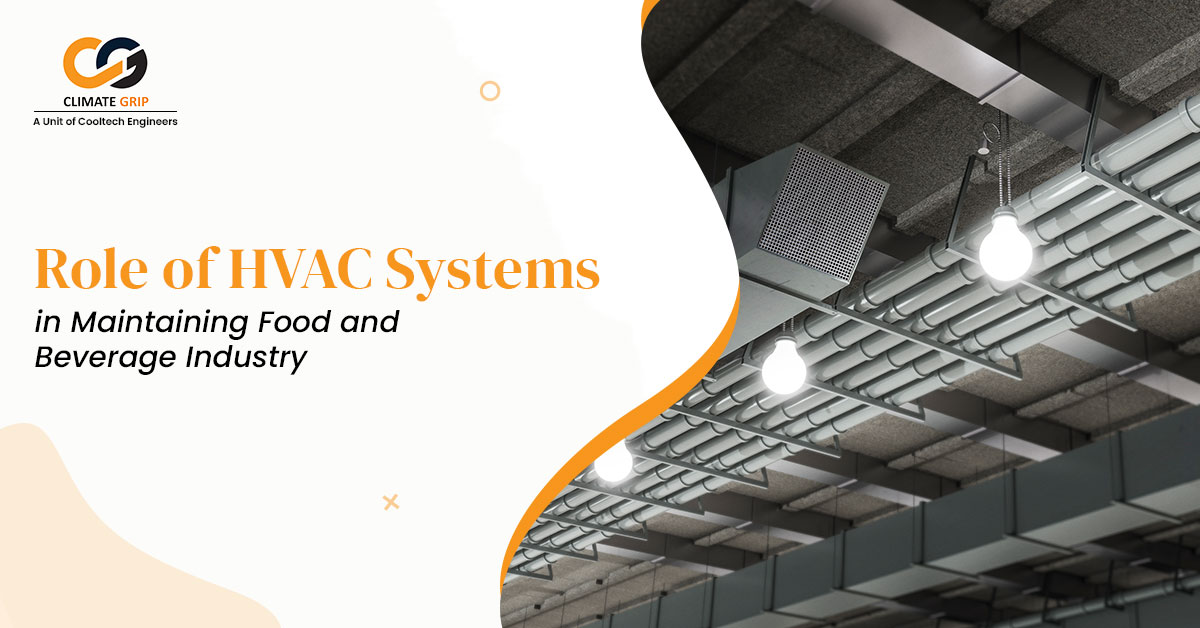The HVAC (Heating, Ventilation, and Air Conditioning) system plays a important role in the food and beverages industry to achieve and maintain the requirement. It relies heavily on maintaining a strict environment industry throughout the processing stage to ensure product quality, safety and compliance with regulations.
In This Article, you will learn about the role of HVAC systems in maintaining the food and beverage industry, highlighting their importance in ensuring optimal production and overall quality control.
Air Quality and Ventilation
In the Food and Beverage industry, maintaining high air quality is essential to prevent the accumulation of airborne contaminants in food and beverage processing facilities. These systems facilitate proper ventilation, purification of the air, filtering ensuring a clean and safe working environment. Quality of the product and employee health can compromise due to airborne contaminants, including dust, allergens, odors and potentially harmful particles. HVAC systems are equipped with air filters and purification technologies, such as high-efficiency particulate air( HEPA) filters, UV germicidal irradiation and carbon filters, effectively removing these contaminants from the air, minimizing the risk of cross-contamination.
Proper ventilation through the system also helps to control odors and maintain fresh air indoor quality. However, well-ventilated processing areas and storage facilities are crucial for managing heat generated by equipment, ensuring the comfort and safety of personnel working in these environments.
Optimal Temperature Control
Controlling temperature to maintain the food and beverage processing is very crucial in these industries. We have to maintain the quality of the product, prevent spoilage and inhibit microbial growth. HVAC system helps to precise control over the temperature, enabling manufactures to create and maintain the ideal condition for processing and storage. HVAC ensures that compostable goods remain within the required temperature range, protecting them from spoilage and contamination. It is equipped with temperature sensors, thermostats, and automated controls that regulate the ambient temperature in processing areas, cold storage rooms and refrigeration units.
Humidity Control
Humidity control is one of the critical parts in the food and beverage industry, Excessive moisture can lead to product deterioration, mold growth, and bacterial contamination, compromising both quality and safety. Insufficient humidity levels can cause products to dry out, impacting texture, taste and overall consumer satisfaction.
Through HVAC systems you can control effective humidity by removing excess moisture from the air and adding moisture in it. Dehumidifiers extract moisture, preventing condensation and mold growth in processing areas, storage rooms, and packaging facilities. Products like grains, spices, and some certain confectioneries have the necessity of humidity control.
Compliance with Regulation
Food and beverage industry has strict rules and guidelines for the quality, freshness, consumer health and well-being. HVAC systems are capable of fulfilling these demands and preserving compliance. According to the Food and Drug Administration (FDA) , temperature control, ventilation and air quality are the most important rules in the food and beverage industry. Respecting these rules is essential to preventing product contamination, guaranteeing worker safety, avoiding fines, and preserving one’s reputation. HVAC equipment needs to have regular maintenance, calibration, and validation in order to operate at peak efficiency and reduce the possibility of failures or deviations from specifications.
Conclusion:
In this , we mentioned the role of HVAC systems in maintaining the food and beverage industry. HVAC systems play a critical role in controlling temperature, humidity, air quality , preserving product quality, extending shelf life, preventing spoilage as well as consumers safety. Manufactures must invest in high quality HVAC systems and prioritize their proper maintenance to maximize operational efficiency, minimize waste and have to safeguard their reputation in an industry where quality and safety are primary key in the food and beverage industry.

